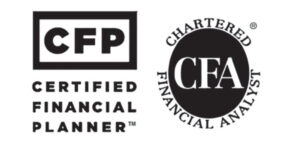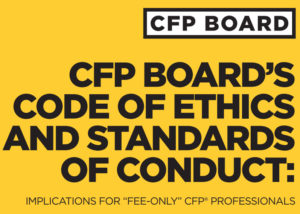
Some commission-paid financial advisors make recommendations that favor high-commission products and too frequent trading, aka churning.
A fee-only, fiduciary advisor recommends investments based on the client’s risk tolerance and goals. The advisor doesn’t earn commissions for trades or financial products sold.
That’s why we believe the “Fee-Only” compensation method is the most transparent and objective model for advisor compensation.
The “Fee-Only” model reduces conflicts of interest and helps ensure that your financial planner acts in your best interest when making investment recommendations. Fee-only advisors are compensated directly by their clients for advice, not by insurance companies or product sponsors.

“A CFP® professional may describe his or her or the CFP® Professional’s Firm’s compensation method as Fee-Only only where: (a) the CFP® professional and the CFP® professional’s Firm receives no Sales-Related Compensation; and (b) Related Parties receive no Sales-Related Compensation…” – source file
In other words, a financial advisor claiming to be “fee-only” must not receive sales-related commissions directly or indirectly.
No. An insurance agent who receives a commission from an insurance agency or company for selling a variable or equity-linked annuity is not considered a “fee-only” advisor. Similarly, a Series 7 Registered Representative, paid a sales commission by a Broker-Dealer for selling an investment, does not meet the fee-only definition.
When seeking financial advice, look for fee-only fiduciary advisors with credentials like the CFP or CFA. Ask advisors to explain their compensation and incentives. Is your advisor compensated with commissions or other payouts on your investment transactions?
Key takeaway: Beware, “Fee-Based” is a misleading marketing term that means compensation by fees and commissions. Watch the video and read the transcript below for more on this.
In the new Code of Ethics and Standards of Conduct, see if your board also addresses another term: ‘fee-based.’ ‘Fee-based’ is a term often used in the professional community, but there’s no universal meaning. Clients often don’t understand what the term ‘fee-based’ means, and unfortunately, they often believe that being fee-based means that you’re fee-only, which typically is not the case. A CFP professional cannot use the term ‘fee-only’ if they’re receiving sales-related compensation, or if their firm is receiving sales-related compensation.
In addition, if a CFP professional’s related party, which is another term defined in the Code and Standards, receives sales-related compensation in connection with the services that the CFP professional, or the CFP professional’s firm, is providing, then the CFP professional is prohibited from using the term ‘fee-only.’
At CFP Board, we are compensation-neutral. We recognize that all CFP professionals can act as a fiduciary, whether they’re receiving fees or sales-related compensation. In other words, from CFP Board’s perspective, the key is not ‘fee-only’; it’s being a fiduciary. And all CFP professionals are required to act as a fiduciary at all times when providing financial advice. To learn more about the new Code of Ethics and Standards of Conduct, visit CFP.net/code.

Get an expertly tailored investment portfolio custom to your needs. Book a free consult to secure retirement income, reduce taxes, and safely grow wealth.

Get an expertly tailored investment portfolio custom to your needs. Book a free consult to secure retirement income, reduce taxes, and safely grow wealth.
Copyright© 2024 Successful Portfolios. Powered by PressGo Digital